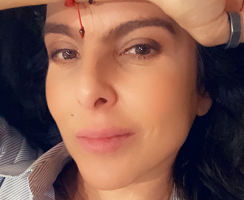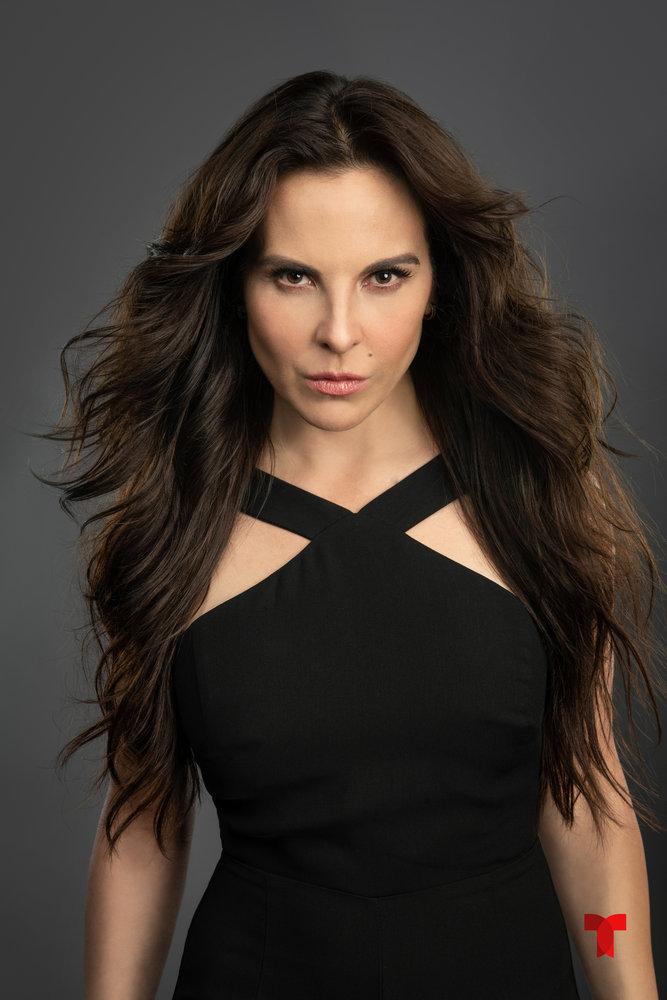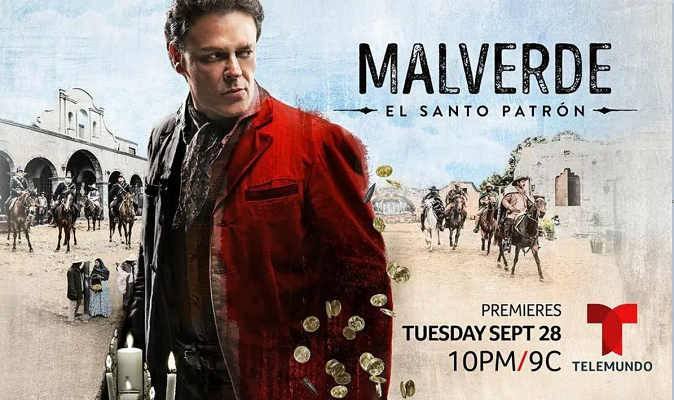TV Interview!

Interview with Kate del Castillo, star of “La Reina del Sur” on Telemundo by Suzanne 8/8/22
NBCUNIVERSAL SUMMER 2022 TCA VIRTUAL PRESS TOUR
Telemundo La Reina Del Sur
Introduction: Claudia Franklin
Kate del Castillo, Talent
Virtual via Zoom August 8, 2022
© 2022 NBCUniversal Media, LLC. All rights reserved.
This was for the Television Critics Association panel. I was able to ask Kate a few questions, which was nice. The TCA panels usually have many journalists waiting to ask questions, so I’m lucky if I get to ask one! Anyway, if you know the USA Network show “Queen of the South,” it’s based on this show, which ran for 1 season in 2011, had a second season in 2019 and is now coming back for a third season. “La Reina del Sur” is “based on a novel of the same name by Spanish author Arturo Pérez-Reverte,” according to Wikipedia. If you watch Telemundo or other Spanish-speaking networks, I’m sure you already know about this series.
 Here are the opening remarks, to tell you about the show. “Thanks for joining us to learn more about “La Reina del Sur,” Season 3. In 2011, the launch of “La Reina del Sur” propelled Telemundo to the top of the charts, and gave way to Telemundo’s Super Series franchise. The first two seasons of this blockbuster hit, which has since been adapted in English by USA Network, reigned as the #1 program in its time slot in the United States, regardless of language. Now Telemundo’s global hit returns for a third season with the unstoppable Teresa Mendoza, portrayed by superstar Kate del Castillo. Season 3 of “La Reina del Sur” opens four years after the second season with Teresa Mendoza behind bars in the U.S. for the murders of three DEA agents. Stripped of her freedom, she’s, once again, separated from her beloved daughter Sofia. After being freed in a dramatic jailbreak, Teresa returns to a covert world powered by alliances and secret deals. Risking her life throughout Latin America with the fervent hope that she can reunite with Sofia, and end her life as a fugitive, once and for all. “La Reina del Sur” premieres in October. Joining us today is Kate del Castillo. We’re now ready to take your questions.
Here are the opening remarks, to tell you about the show. “Thanks for joining us to learn more about “La Reina del Sur,” Season 3. In 2011, the launch of “La Reina del Sur” propelled Telemundo to the top of the charts, and gave way to Telemundo’s Super Series franchise. The first two seasons of this blockbuster hit, which has since been adapted in English by USA Network, reigned as the #1 program in its time slot in the United States, regardless of language. Now Telemundo’s global hit returns for a third season with the unstoppable Teresa Mendoza, portrayed by superstar Kate del Castillo. Season 3 of “La Reina del Sur” opens four years after the second season with Teresa Mendoza behind bars in the U.S. for the murders of three DEA agents. Stripped of her freedom, she’s, once again, separated from her beloved daughter Sofia. After being freed in a dramatic jailbreak, Teresa returns to a covert world powered by alliances and secret deals. Risking her life throughout Latin America with the fervent hope that she can reunite with Sofia, and end her life as a fugitive, once and for all. “La Reina del Sur” premieres in October. Joining us today is Kate del Castillo. We’re now ready to take your questions.
I asked Kate what has changed most for her doing the show and as an actress. She dove right in with a frank answer that aging has been a problem – it’s tougher on her physically. She explained that “it’s a very different show” because the first season was based on the novel, and these last two seasons are still written by the same author, Reverte, but not from a novel. She praised their “amazing writers.” Unlike the first two season, this season is not about narcotics or selling them. She’s extremely happy about that because she’s always stated that her character, Teresa Mendoza, “is Teresa Mendoza regardless of what she does for a living.” She went on to explain that she’s a survivor and not a victim (no matter what happened to her), and she lives in the man’s world, but “she makes the most out of it.” She also explained that Teresa is more mature and a mother. She also joked that the budget is a lot better, too.
In my second question, which was somewhat similar to the first, I asked her what challenged her in the new season, playing Teresa. She answered that playing a mom is challenging for her, since she’s not one – especially since her character’s daughter is a teenager. Also, this season they traveled to many different countries, wearing all different clothes, that are “amazing” and “culturally different.” She said they dress her in a very native way.
She also told us that she decided to really challenge herself physically, so she decided to change her body completely. She “got ripped” and lost a lot of weight. She worked out a lot, and told us, jokingly, that she only ate one lettuce leaf per day. She figured that Teresa would do that while she was in prison for four years. She worked hard to redeem herself, “to get freedom.” Also, “she’s coming out to revenge,” so she has to be “ready for action.” So this Teresa is a very different one physically.
Other press asked their questions. Kate was asked whether she had expected the show to become “an international hit,” or was she surprised? She agreed that it was “a pleasant surprise.” She reminded us that the show is #1 in its time slot, regardless of language. The “crossover” effect gratified her. She revealed that she was in a play in New York that sold out, to which she credits the effects of the show being such a big hit. She continued that nobody knew it would be a hit before they made it. The book had been a “bestseller for decades,” but the show was very low-budget. She cried when it did well and thanked god. They shot it down in Colombia and Spain, where it was very difficult for them. So they were surprised, but very happy, when it was such a hit.
Another reporter asked a long and detailed question about how the production values of Spanish language television have evolved. She gave an example of the background music being used. Kate agreed enthusiastically that the production values have changed a lot. Their new show has “Miami Symphony Orchestra” and “Carlos Rafael Rivera, who’s an Emmy and Grammy winner” doing the scores for the show and the theme song. She compared this show to telenovelas, which typically go on for “up to 200 episodes” and are more low budget. Their show is a much more ambitious TV series for a Spanish-speaking audience.
Next she was asked how she felt about the USA Network version, so that those who don’t speak Spanish could enjoy it in English. While Kate agreed that it’s a good thing, she hopes that more people in the US would read subtitles and hear her voice. As a viewer, she likes to watch shows in other languages and hear the actors’ voices. She just wishes that Spanish-language shows all had the great budgets that English-speaking shows do. She hopes that will change.
The next reporter pointed out that Teresa started out as a naive young woman and then became a criminal and found her voice and strength. The person asked Kate how much of herself is in Teresa. Interesting question!
Kate replied that there is a lot of her in the character. She told us that she has given Teresa a lot, and Teresa has given her a lot as well. She ticked off their similarities: they both like men and tequila a lot, and they both like to say nasty things (which she admits is not so good). She said they both love passionately and neither one has been that lucky in love. Even though she’s not a mother, she thinks that the way she gives her love is very motherly and protective. She added, “I think we both survived a lot of stuff.” She also added that when she’s not feeling great about something, she asks herself, “What would Teresa Mendoza do?” It helped her sometimes. She hopes that in the future, though, that she’ll be more lucky in the romance department. It sounds like she’s as honest as her character, too.
Kate’s father was also an actor, in telenovelas, so she was asked about that. She disclosed that her father “just turned 88” and “is still working” quite a bit. She pointed out that he started in movies and has done over 350, as well as the telenovelas. She described what it was like for him, that the movies were really bad, and that as a Mexican actor, you had no choice but to do that or the telenovelas when they came along. Then the Cine De Oro came along, when Mexican movies improved, so now they’re much better. She also did some movies, and 10 telenovelas, which helped her learn her craft. She admires how they’re so popular everywhere now because they “sell fantasies.” When she was the lead of the telenovelas, though, it wasn’t as much fun for her as an actress. She came to the U.S. to find better roles.
Kate was asked whether Teresa being a mother made her stronger or more vulnerable. She reminded us that in the first season, she was revealed to be pregnant near the end, and she told another character that she was going to have the child because she had become fearless, and she wanted to know fear again. The second season was all about getting her daughter back (from being kidnapped). She was vulnerable in that sense. She pointed out that you have to have both strength and vulnerability in a character because “one feeds the other.”
She was also asked about being a woman starring in an action role. Kate replied that now women with power are coming into their own in TV and movies. She thinks it’s because women are smart and have to grow up and live in “this macho land.” Teresa is in “this terrible world of killing, and drugs, and trafficking,” but she turned lemons into margaritas. She went on about how women are still doing their traditional roles as mothers and keeping house, but they also work and do many more things than they used to. She, Kate, is looking for great women’s roles, as an actress and producer. She noted that it’s hard to find the line between empowerment and being sexy. You want the character to be strong and sexy but without “objectifying” her. Teresa walks that line. She feels that the character is sexy but “never cared about her looks.” She’s attractive because of being smart and generous, and how she makes her own decisions. She ended with, “she did commit many mistakes, which makes her this anti-heroine that a lot of people relates to because she has all these flaws, and I think that’s what makes her more interesting.” I have to agree with that.
She was also asked about Telemundo and what they’ve brought to the U.S. Latino market, quality-wise. Kate praised Telemundo for being daring. She said that other networks like Univision and Televisa remake telenovelas, but Telemundo comes out with their own original content. They take more risks. She knows they support her because of how successful the franchise is. She also loves that they made a great deal with Netflix for exclusive content.
 Then she was asked why it took 8 years between the first and second seasons (I had wondered that, too). She explained that it was because she had gone to the U.S. and was doing other projects as a result of how successful “La Reina Del Sur” was. She didn’t expect another season, and neither did the author. Then Telemundo grew, and people became more aware of her because of movies and series she did, but she always had Teresa Mendoza on her mind. She expressed how much fun it was to play her. Eventually, they called her and told her that Reverte was involved, and they would make a new season. So she agreed because of that, and because she loved the idea of playing Teresa again. She was very surprised that it was even more successful than the first one. She didn’t think people would even care, since it was 8 years later.
Then she was asked why it took 8 years between the first and second seasons (I had wondered that, too). She explained that it was because she had gone to the U.S. and was doing other projects as a result of how successful “La Reina Del Sur” was. She didn’t expect another season, and neither did the author. Then Telemundo grew, and people became more aware of her because of movies and series she did, but she always had Teresa Mendoza on her mind. She expressed how much fun it was to play her. Eventually, they called her and told her that Reverte was involved, and they would make a new season. So she agreed because of that, and because she loved the idea of playing Teresa again. She was very surprised that it was even more successful than the first one. She didn’t think people would even care, since it was 8 years later.
Another person from the press asked her if viewers in Spanish-speaking countries enjoyed the same elements of the show as the fans in the U.S. did. Kate spoke a bit about the different types of Spanish used in the series and how people in different countries reacted to them. She feels that the show is very inclusive because they have 20 different nationalities represented by the actors. She said, proudly, “You’re going to see a Latin America that you’ve never seen before: Huge, beautiful, and magnanimous, like it is.”
She was asked a question about the American version of the show – what impact that had on her show (if any). She said that the USA Network version didn’t get nearly as good ratings as theirs did, so she didn’t think it had much effect. She looks at that version as a very different Teresa Mendoza, like “an alter ego.” She didn’t think it had much to do with the book, as theirs does. She did, however, say that she thought the show was great and that the lead actress, Alice Braga, “did an amazing job.” She praised her beauty and talent.
MORE INFO: Trailer

Based on Arturo Perez-Reverte’s novel, Telemundo’s globally acclaimed Super Series™ La Reina del Sur (The Queen of the South) returns for its highly anticipated third season of unparalleled magnitude, starring global superstar Kate del Castillo. Four years have passed since U.S. authorities convicted Teresa Mendoza for the murders of three Drug Enforcement Agents. Separated from her beloved daughter Sofia, Teresa lives behind bars in a maximum-security prison, stripped of all freedoms. Devising a highly sophisticated escape plan, Teresa’s old friends Oleg and Jonathan daringly extract her from prison to take her to Mexico, meeting President Epifanio Vargas. In a world motivated by alliances and secret deals, Teresa agrees to embark on her most dangerous mission yet, taking her throughout Latin America with the urgent hope that she can end her fugitive’s life and reunite with Sofia at last. La Reina del Sur 3 premieres in October on Telemundo.
Kate Del Castillo
Teresa Mendoza, “La Reina del Sur”

A powerful artistic force since her teens, actress-producer KATE DEL CASTILLO returns to one of her most iconic roles as Teresa Mendoza in Telemundo’s blockbuster Super Series™ “La Reina del Sur.” One of the most anticipated television events, the second season of the groundbreaking series premieres on the network in 2019.
Following a decade as one of the most sought-after talents on Mexican television, Del Castillo’s American film breakthrough occurred with the award-winning 2007 hit “Under the Same Moon” (“La Misma Luna”), directed by Patricia Riggen. Co-starring Eugenio Derbez, the bilingual film remains one of the highest-grossing and influential Spanish-language theatrical releases in U.S. history.
Del Castillo has carefully nurtured a multi-national presence. Among the highlights of her varied film career is her star turn as a Bolivian dancer in “American Visa,” winning Best Actress Awards at film festivals in Spain and Brazil, as well as a Best Actress nomination at the Ariel Awards. “American Visa” received its sold-out U.S. premiere at the AFI Film Festival in Los Angeles. Her feature film credits include “Julia” with Tilda Swinton, “Trade” co-starring Kevin Kline, and “No Good Deed” with Idris Elba. In 2015, Del Castillo reteamed with director Patricia Riggen to join the ensemble cast of “The 33,” a powerful telling of the 2010 Chilean mining disaster. She currently can be seen with Mary Elizabeth Winstead, Common, and Chace Crawford in the Eva Vives-directed comedy “All About Nina.”
Del Castillo continues to court success on television, reaching beyond Spanish-speaking audiences on various platforms. In 2009, she starred with Guy Ecker in Univision’s first-ever webnovela “Vidas Cruzadas” (“Crossed Lives”), which she co-produced. Del Castillo hit a new career peak in 2011 in the title role of “La Reina del Sur”(“Queen of the South”), a gritty primetime serial produced by Telemundo and Spain’s Antena 3. As Teresa Mendoza, a Mexican woman who rises to amass great power within the world of international drug trafficking, Del Castillo’s indelible turn helped redefine the role of female lead in the telenovela genre. Based on the bestseller by Spanish novelist Arturo Perez-Reverte, the series became a cultural phenomenon, spawning an American version on the USA Network.
Her continuing relationship with Telemundo also include the 2015 ratings smash “Duenos del Paraiso,” which premiered at #1 and remains the network’s highest-rated premiere to date. That same year, Del Castillo joined the cast of the award-winning CW romantic comedy series “Jane the Virgin,” portraying Rogelio’s (portrayed by Jaime Camil) first ex-wife.
In 2017, Del Castillo starred as Emilia Urquiza in the Netflix political thriller “Ingobernable,” one of the first dramatic series produced in Mexico by the streaming giant. Its success generated a second season in 2018, now airing worldwide. Other noteworthy television credits include a five-episode arc on Showtime’s acclaimed series “Weeds.” Del Castillo also starred in Gregory Nava’s lauded PBS series “American Family,” which marked her crossover debut on American television.
A philanthropist and an outspoken global activist, Del Castillo, was appointed Ambassador for the Mexican Commission on Human Rights to combat human trafficking in 2009, launching the Blue Heart campaign in Mexico City. She remains a devoted spokesperson for PETA, earning the organizations 35th Annual Humanitarian Award in 2015.
Proofread and Edited by Brenda
Back to the Primetime Articles and Interviews Page






